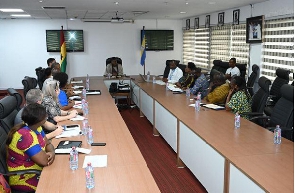A team from the United States Department of Agriculture (USDA) has paid a working visit to the Ghana Ports and Harbours Authority to engage the authority on a number of issues that affect trade.
The team is in Ghana to meet key institutions to understand Ghana’s approach to the generation of agricultural and related trade statistics to support the implementation of the African Continental Free Trade Area Agreement.
The team was received by the Director General of the Ghana Ports and Harbours Authority, Micheal Luguje.
Issues discussed centered on how data on agricultural products are collected, the challenges in collecting data, and how data is streamlined.
The USDA team believes the information gathered will assist them in coming up with a report that will provide recommendations to serve the interests of participating countries under the AfCFTA.
“This information will help us with a report that will hopefully provide recommendations and follow-up actions that will serve the interests of participating countries. We are going to share our recommendations with the Secretariat and together we will work with them to determine follow-up actions that will help implement the trade agreement,” Pauline Simons with the Foreign Agricultural Service, USDA said.
The General Manager, Marketing and Corporate Affairs at GPHA, Esther Gyebi-Donkor took the team through the cargo handling process at the port and how data is captured.
She revealed that due to its perishable nature, most of the agricultural produce goes through the airport, even though some significant amount goes through Ghana’s ports.
“When the produce is stuffed on the farms, we depend on the declaration of the exporter,” she said.
The Acting General Manager for Corporate Planning, Khalid Nuhu added to that.
“The exporter will first provide the manifest indicating quantities and that is verified at the waterfront. That data is processed and integrated into our total data for import and exports.”
The Director-General of GPHA, Micheal Luguje described some challenges associated with maritime transport within the continent of Africa.
He said one major problem for parties interested in small-scale carriage of goods for intra-continental trade is achieving economies of scale for profitability.
Business News of Thursday, 31 August 2023
Source: Eye on Port

















